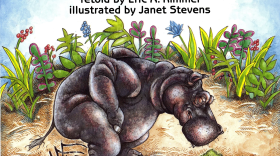Freddi Evans
Host of Little Voices, Big IdeasFreddi Williams Evans is the author of three historical and award-winning picture books: Hush Harbor: Praying in Secret (Carolrhoda, 2008), The Battle of New Orleans, the Drummer’s Story (Pelican Publishers, 2005), and, A Bus of Our Own (Albert Whitman, 2001). She is also internationally recognized for her scholarship on Congo Square, a historical landmark of African American culture in New Orleans. Along with over a dozen published essays and countless presentations, her books on the subject are Come Sunday, A Young Reader’s History of Congo Square (ULL Press, 2017), and Congo Square: African Roots in New Orleans (ULL Press, 2011), which received the 2012 Louisiana Humanities Book of the Year award and has been published in French.
As an educator, Freddi administered and implemented arts education programs in the Jefferson Parish Public School System, the Contemporary Arts Center New Orleans, and the Ashé Cultural Arts Center. As a community activist, she has served on several committees to erect historical markers that commemorate African American history, including co-chairing the New Orleans Committee to Erect Historic Markers on the Slave Trade to Louisiana at the request of the National Park Service. Among her numerous honors, Freddi was named the Grand Griot of the 19th Annual Maafa Commemoration in New Orleans in 2019 and a “Humanities Hero” by the Louisiana Endowment for the Humanities in 2017.
One of my favorite books is Amazing Grace because of the simple yet successful way in which author Mary Hoffman presents social justice issues including race, class and gender. With family intervention and a bit of inspiration, Grace perseveres and overcomes the self-doubt imposed by society’s racial and gender norms. Grace not only changes inwardly; she becomes a change-agent in the world around her.
-
In this episode, we explore what makes this tale so endearing--and enduring--and why Where the Wild Things Are allows parents and children to have tame talks about the pain of punishment, and the healing power of the imagination.
-
Anansi the spider, the thieving trickster at the heart of Eric Kimmel’s Anansi and the Moss-Covered Rock, offers up an opportunity for pushing past mere moralizing toward more nuanced conversations about when tricks cross over into deception territory--and even when a seemingly harmless little lie may not be seen as such by others.
-
In this episode, we discuss Jacqueline Woodson’s The Other Side, a beautifully illustrated picture book set during the segregation era--and how to use it to invite safe, non-didactic conversations about how our racial differences have divided us, and how we can take the conversation forward.
-
In Episode 3 of “Little Voices, Big Ideas,” we hear from the big bad wolf, himself, in John Scieszka’s The True Story of the Three Little Pigs, and offer strategies for encouraging kids to think critically before jumping to conclusions.
-
Episode 2 of “Little Voices, Big Ideas,” makes the case for discussing the big ideas found in the book that everyone loves to love--or loves to hate--Shel Silverstein’s The Giving Tree.
-
Maurice Sendak’s classic children’s book, Where the Wild Things Are, takes readers on an extraordinary journey into the imagination of the wildest thing…
-
There’s plenty of attention given to the pursuit of “happily ever after” in stories of all sorts. But how should we go about acquiring happiness? Is there…
-
Of all the difficult subjects deserving of discussion with children, race and racism are perhaps the most required, and least easy to address. In fact,…
-
The big bad wolf shows up in many forms in children’s stories--even disguised as grandma--with the intention of teaching children to be wary of the bad…
-
Episode 2 of “Little Voices, Big Ideas,” makes the case for discussing the big ideas found in the book that everyone loves to love--or loves to hate--Shel Silverstein’s The Giving Tree.











